Central Command Council
Central Command Council | |
|---|---|
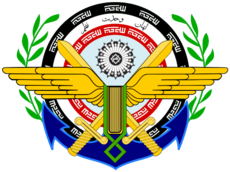 | |
| Type | |
| Type |
|
| Leadership | |
Chairman | Maj. Gen Alireza Fadavi since 18 June 2016 |
| Structure | |
| Seats | 17 |
Political groups | Military |
| Meeting place | |
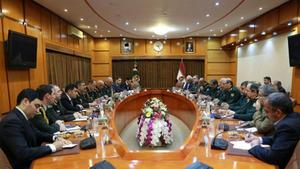 | |
| Zahedan, Pardaran UR, Zorasan | |
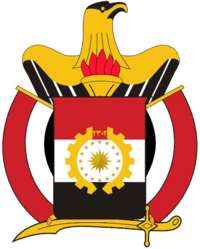 |
|---|
| This article is part of a series on the politics and government of Zorasan |
The Central Command Council is the most senior military body in Zorasan, that serves as an executive council, legislative council, the country's national security council and the secondary federal Election supervision body. The Central Command Council is also endowed with significant powers and responsibilities. The CCC's influence and power over matters of government is such, that many commentators regard the body as the true political authority in Zorasan.
The CCC is comprised of 16 members drawn from all branches of the Zorasani Irfanic Revolutionary Army and is headed by the commander-in-chief of the armed forces. The CCC is charged by the 2008 constitution to, supervising elections of, and approving of candidates too, the Popular Assembly, Superior Assembly, municipal elections and state-level elections. The CCC is also charged with appointing the federal ministers for Foreign Affairs, Internal Affairs, National Defence and State Intelligence and Security. By virtue of these appointments, the military has the final say on foreign policy, internal law and order and state intelligence. In both chambers of the legislature, the CCC appoints two-thirds of the upper-house and 10% of members to the lower-house, with the former being mostly comprised of senior level commanders, who are granted seats for life.
In 2017, the powers of the CCC were expanded with the right to determine the annual military budget independently of the Ministry of Finance. This also supported by the denial of the civic government to replace military officers without the authorisation of the CCC. In 2018, this was further developed with the CCC being given sole authority to promote, dismiss and appointed military officers.
Powers and responsibilities
The Central Command Council is imbued with a wide range of powers and responsibilities by the 2008 Constitution, these cover areas relating to the national legislature, executive and judicial branches, while also enjoying significant influence over the country’s electoral system. These powers also stand alongside the exclusive organisational and administrative responsibilities for the Zorasani Irfanic Revolutionary Army, of which, the Central Command Council members also serve as the Revolutionary Central Command (chiefs of staff).
Under the 2008 constitution, which established the Civic-Military State, the CCC is mandated to
Political
- Appoint two-thirds (335) members of the Superior Assembly of the Union, this also includes the appointment of life term members, who are military officers at the rank of brigadier general and above. This also requires the maintenance and organisation of Zorasan Zindebad, the political grouping of military members in the upper house.
- Appoint the chairpersons of the Assembly Committees on Foreign Affairs, National Security, Defence and Law Enforcement, from members of the Popular Assembly of the Union.
- Confirm or reject the First Minister’s appointments for the Union Ministries of Foreign Affairs, Internal Affairs, National Defence and Justice.
- Produce and provide the annual defence budget for the Union Ministry of Finance following consultation with the UMF.
- Provide advice and the final policy confirmation for matters relating to foreign, security, defence and internal security.
- Appoint Special Representatives of the Central Command Council to each of the Union Republics of Zorasan, to observe state-executives and to report back to the Central Command Council.
- Appoint the Chair and Deputy Chairperson of the Union Electoral Commission. Through the UEC, the CCC is mandated to vet candidates for the federal legislature on the basis of “ideological moderation.”
Judicial
- Appoint the presiding judges of the State Security Tribunals.
- Advise on and produce legislation via the Union Ministry of Justice to provide the legal foundations for the State Security Tribunals.
Military
The military responsibilities of the Central Command Council is conducted through its subordinated body, the Revolutionary Military Command. The RMC's membership is identitcal to the CCC. The Revolutionary Military Command's duties and responsibilities are:
- Ensure personnel readiness of armed forces.
- Formulate strategic and tactical policy.
- Improvement and modernisation of the structure and organization of the armed forces.
- Development and introduction of training manuals, tactics, and methodology for distribution to all branches.
- Development of military theory and practice.
- Advising the civil executive on security and military matters.
Subordinate organisations
The CCC maintains direct control and authority over a series of key national institutions, some of which hold significant sway over Zorasani society. These organisations are as follows:
- General Intelligence Service: the military intelligence service. Since 2008, the GIS has surpassed the Union Ministry of State Intelligence and Security as the primary domestic security service. It also manages Zorasan's signals intelligence and cyberwarfare service.
- State Commission for Societal Defence: the SCSD is taksed with organising and managing the various patriotic grass-roots groups and organisations, the largest and most successful being the Wolves Organisation. The SCSD also serves as an anti-corruption task force, the official state censor and maintains the national telephone helpline for citizens to report "subversive behaviour."
- State Commission for Public Services: the body tasked with overseeing the civil service at the federal and state level. Its primary duty is to ensure the effecient implementation of government policies, but also to ensure the "patriotic service" of civil servants. This body is unique in that is managed equally by the CCC and civilian government.
- Inter-Services Discipline Office: the body charged with disciplining members of the armed forces in relation to corruption, political activities and crimes against the state.
- Inter-Services Media Affairs Office: the overseeing body for the military's owned or majority owned media outlets, as well as the official public relations department of the military.
- Great Soldier Foundation: this is the holding company for the military's various businesses and interests. It is the second largest holding company in northern Coius, with an estimated $239 billion in managed assets.
- Bonyad Peŝvar Khosrow: this is the military's bonyad dedicated to fundraising for veterans and providing financial support for those with life-altering injuries. The BPK is one of the largest providers of after-care, physical rehabilitation training in the country.
- Zorasan Ordnance Factories Corporation: is Zorasan's second largest military contractor and producer of firearms, explosives and armoured vehicles. It is overseen directly by the CCC independently of the Great Soldier Foundation.
Membership
| # | Portrait Name |
Birth year |
Central Command Council posts | Duties | Party | Military positions | ||
|---|---|---|---|---|---|---|---|---|
| 1 |  First Marshal of the Union Adavazdar Golzadari آدوازدار گلزادری |
1960 | Chairman of the Central Command Council Union Minister of National Defence |
Overall work of the Central Command Council National defense mobilization, etc |
National Renovation Front | Commander-in-chief of the Zorasani Irfanic Revolutionary Army Chief of the General Staff Headquarters | ||
| 2 | 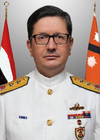 Admiral of the Union Hassan al-Muqallah آدوازدار گلزادری |
1964 | Deputy Chairman of the Central Command Council Union Sub-Minister for the Interior |
Administrative work of the Central Command Council Providing advice and the final say of the CCC on internal affairs |
National Renovation Front | Commander of the Zorasani Irfanic Revolutionary Navy Deputy Chief of the General Staff Headquarters | ||
| 3 | 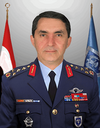 Air Marshal of the Union Sayeed Kharimpour آدوازدار گلزادری |
1965 | Central Member Official Representative to the Supreme Assembly of the Union |
Represents the Central Command Council at Parliamentary Committee meetings in the national legislature | National Renovation Front | Commander of the Zorasani Irfanic Revolutionary Air Force | ||
| 4 | 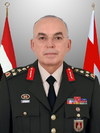 Marshal of the Union Kamshad Radan آدوازدار گلزادری |
1964 | Central Member Union Sub-Minister for National Defence |
Deputising the Chairman of the CCC as Minister for National Defence | National Renovation Front | Commander of the Zorasani Irfanic Revolutionary Land Forces | ||
| 5 | 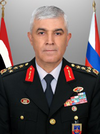 General Sadiollah Sandsari آدوازدار گلزادری |
1963 | Central Member Union Sub-Minister for State Intelligence and Security |
Deputising the Union Minister for State Intelligence and Security and representing the military's interests | National Renovation Front | Commander of the National Protection Force | ||
| 6 | 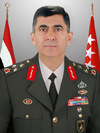 Major General Zeidan Kara آدوازدار گلزادری |
1962 | Alternative Member Chief of Staff for Joint Operations Command |
Commanding the inter-services coordination command. | National Renovation Front | Commander of the Takavar Corps | ||
| 7 | 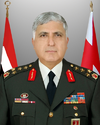 General Javad Farhani آدوازدار گلزادری |
1959 | Alternative Member Director-Commander of the General Intelligence Service |
Head of the military intelligence service | National Renovation Front | Chief of Staff for Joint Intelligence | ||
| 8 | 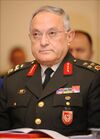 General Nadhim Malkawi آدوازدار گلزادری |
1959 | Alternative Member Director-General for Logistics and Ordinance |
Head of the military logistical corps and ordinance production | National Renovation Front | Chief of Staff for the Joint Logistical Corps | ||
| 9 |  Brigadier General Valiollah Zahirnejad آدوازدار گلزادری |
1959 | Alternative Member Director-Commander of the ISOMPA |
Head of the office dedicated to media and public relations | National Renovation Front | Chief of Staff for External Relations | ||
| 10 | 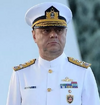 Admiral Khalifa al-Kuzbari آدوازدار گلزادری |
1959 | Alternative Member Commander for Joint Operations and Planning |
Head of the inter-services operational, strategic and tactical planning command | National Renovation Front | Chief of Staff for Strategic and Operational Planning | ||